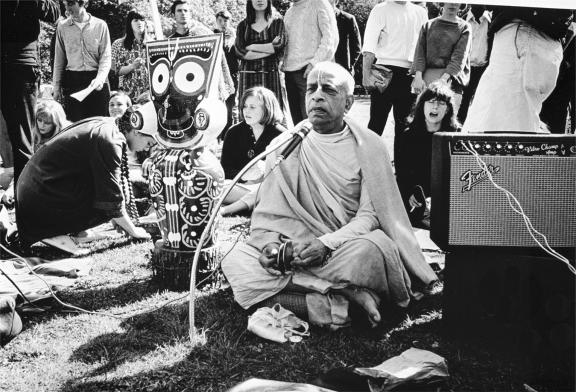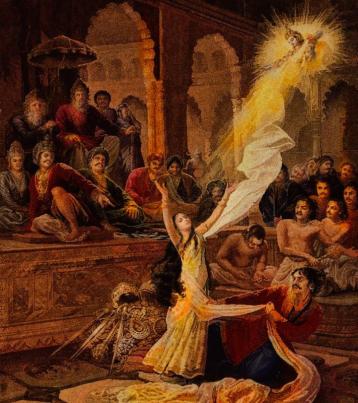
Lord Krishna’s main message in the Bhagavad-gita is clear: He wants us to fully surrender to Him. The most vital part of the Bhagavad-gita deals with the advice Lord Sri Krishna gives to Arjuna on the surrendering process. One of the dictionary meanings of surrender is “to give (something) up voluntarily to another.” Lord Krishna’s simple words of advice on surrendering are easy to understand. So why do most people, including those of us practicing Krishna consciousness, not fully surrender to the Lord? We are practicing spiritual life in the material world, a prison created by the Lord to reform us and to help us surrender to Him. Krishna is very keen to get us back home, back to Godhead. But are we so keen? In Chapter 7, Text 14, Krishna says,
daivi hy esa guna-mayi
mama maya duratyaya
mam eva ye prapadyante
mayam etam taranti te
“This divine energy of Mine, consisting of the three modes of material nature, is difficult to overcome. But those who surrender unto Me can easily cross beyond it.” Krishna has elaborated on the three modes of material nature goodness, passion, and ignorance in Chapter 14. When we are in contact with the material energy and become victims of these three modes, we are called “conditioned.” These modes bind us. Most people do not even know this. Hence they cannot understand what surrender really means. Krishna calls such persons grossly foolish.
Why do even the most educated scholars and leaders not surrender to Krishna? Because they are bewildered by atheism in many forms. They are not sukrtina˙, the pious souls Krishna refers to in Chapter 7, Text 16:
catur-vidha bhajante mam
janah sukrtino ’rjuna
arto jijnasur artharthi
jnani ca bharatarsabha
“O best among the Bharatas, four kinds of pious men begin to render devotional service unto Methe distressed, the desirer of wealth, the inquisitive, and he who is searching for knowledge of the Absolute.”
Atheists do not seek refuge in God. But Krishna classifies four types of persons who take refuge for some benefits in return for their devotion to Him. He recognizes all these people as pious and deserving candidates for surrendering to Him. They are God conscious but are more interested in meeting their personal material goals than in readily surrendering to Krishna.
In Bhakti-rasamrta-sindhu (1.1.11) Srila Rupa Gosvami distinguishes devotees who seek Krishna without expecting any benefits in return, terming them pure devotees:
anyabhilasita-sunyam
jnana-karmady-anavrtam
anukulyena Krishnanu-
silanam bhaktir uttama
“One should render transcendental loving service to the Supreme Lord Krishna favorably and without desire for material profit or gain through fruitive activities or philosophical speculation. That is called pure devotional service.”
Srila Prabhupada compares mixed and pure devotees: “When these four kinds of

persons [mentioned above] come to the Supreme Lord for devotional service and are completely purified by the association of pure devotees, they also become pure devotees.”
Even when people come to Krishna with ulterior motives, they can become pure devotees if they continue to pursue Krishna consciousness and cultivate the association of devotees.
When I visited the Srinivasa Temple in Malibu, near Los Angeles, an Indian businessman had come to the temple with plenty of fruits and flowers.
Handing these to the priest before the arati, he told him, “Please pray that my new business venture becomes successful.”
The priest, a pious Sri Vaishnava devotee, replied, “How can we ask for that? What to give or not to give is dependent entirely on Krishna. So we must leave it to Him instead of asking.”
Pure devotional service means to understand the Absolute Truth and become free from all material desires.
Krishna says in Chapter 7, Text 19,
bahunam janmanam ante
jnanavan mam prapadyate
vasudevah sarvam iti
sa mahatma su-durlabhah
“After many births and deaths, he who is in actual knowledge surrenders unto Me, knowing Me to be the cause of all causes and all that is. Such a great soul is very rare.”
A Message for Everyone
Though seemingly addressed to Arjuna, Bhagavad-gita is a message to all to surrender to Krishna. Krishna gives full importance to the minute independence we have inherited from Him as His parts. He opens up all possible paths one can take to come to Him directly or indirectly. At the same time, He ultimately gives His opinion on the best method to reach Him: the surrendering process.
Krishna explains the surrendering process in Chapter 15, Text 5:
nirmana-moha jita-sanga-dosa
adhyatma-nitya vinivrtta-kamah
dvandvair vimuktah sukha-duhkha samjnair
gacchanty amudhah padam avyayam tat
“Those who are free from false prestige, illusion, and false association, who understand the eternal, who are done with material lust, who are freed from the dualities of happiness and distress, and who, unbewildered, know how to surrender unto the Supreme Person attain to that eternal kingdom.”
Krishna lays down the conditions under which one can surrender to Him and go back home, back to Godhead. Pride, lust, unfavorable association, material conditioning, and the dualities of happiness and suffering are all impediments to the surrendering process. The practitioner of devotional service must practice with care in order to gradually abandon the unfavorable characteristics listed by Krishna. The surrendering process starts with self-appraisal. That is the beginning of renunciation both internally and externally.
Preparing the devotee Arjuna for total surrender, Krishna elaborates on the surrendering process in Chapter 18, Text 65:
man-mana bhava mad-bhakto
mad-yaji mam namaskuru
mam evaisyasi satyam te
pratijane priyo ’si me
“Always think of Me, become My devotee, worship Me, and offer your homage unto Me. Thus you will come to Me without fail. I promise you this because you are My dear friend.” Here Krishna summarizes the process of surrender required of us to become His pure devotee. He gives the method to make Him the center of one’s life.
In Chapter 18, Text 66, Lord Krishna asks Arjuna to completely surrender to Him:
sarva-dharman parityajya
mam ekam saranam vraja
aham tvam sarva-papebhyo
moksayisyami ma sucah
“Abandon all varieties of religion and just surrender unto Me. I shall deliver you from all sinful reactions. Do not fear.” This advice is Krishna’s summary conclusion on Bhagavad-gita after He has explained karmayoga, jnana-yoga, dhyana-yoga, and various processes of meditation, sense and mind control, and so on. This is the key text to show the Lord’s protection of devotees and the process of surrender. Mam ekam: the emphasis is surrender only to Him.
Examples from Scripture
From the scriptures, especially Srimad-Bhagavatam and Mahabharata, we are aware of the histories of pure devotees who have shown us the way of total surrender to Lord Krishna. When Duhsasana tried to disrobe Draupadi, she held on to her sari with her own strength. She wanted to save herself from disgrace in the assembly. Only when her full endeavor could not help her anymore did she lift both hands and surrender to Krishna, begging Him to save her. That was her expression of total surrender.
The scriptures also give the surrendering histories of devotees such as Bali Maharaja, Ambarisa Maharaja, and Gajendra. They are all our role models for the surrendering process.
Surrender Made Easier
The renunciation expected for full surrender appears difficult, especially in this age. Foreseeing this situation, Krishna appeared in the fifteenth century in devotee form as Sri Caitanya Mahaprabhu to simplify the process of surrender. He focused on chanting Hare Krishna, Hare Krishna, Krishna Krishna, Hare Hare/ Hare Rama, Hare Rama, Rama Rama, Hare Hare.
Caitanya Mahaprabhu taught His associates and devotees the process of surrender to Krishna through deity worship, congregational chanting, honoring Krishnaprasadam, associating with likeminded devotees, hearing and reciting scriptures like Srimad- Bhagavatam and Bhagavad-gita, and searching for Krishna like a child crying for its mother. Srila Prabhupada publicized this process and made it accessible through his books.
Drawing from Srila Prabhupada’s books, we can understand that for devotees on the path of sadhana-bhakti (devotional service in practice) who want quick advancement in spiritual life, surrender means:
- To give ourselves completely to Lord Krishna and depend entirely on Him for protection.
- To have full confidence that under any circumstances Krishna will protect us.
- To be ready to accept all that is ordained for us and all karmic reactions, whether desirable or undesirable.
- To realize that the real doer is Krishna and that we depend on Him for any results.
- To understand fully that Krishna is the infinite controller and that we are His infinitesimal controlled parts.
- To realize that we are not the body but the spirit soul.
- To accept that Krishna is the master and we the servitors.
- To follow the instruction of Krishna that we should accept a bona fide spiritual master in the succession as Krishna’s representative and surrender to him and serve him with utmost humility.
By Narasimha Swami Dasa